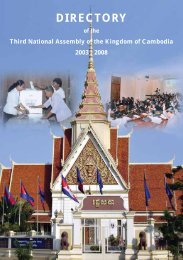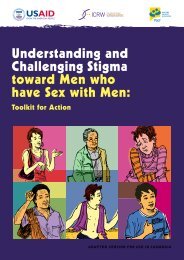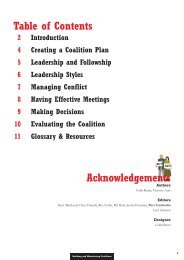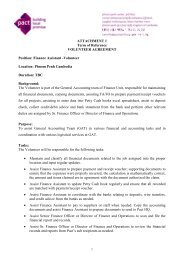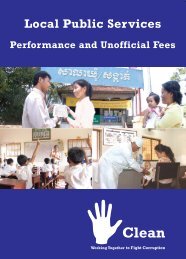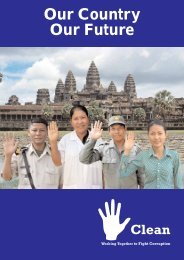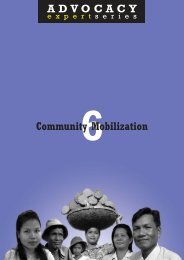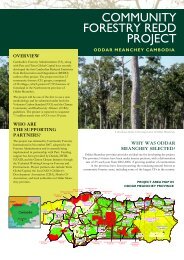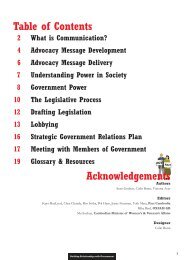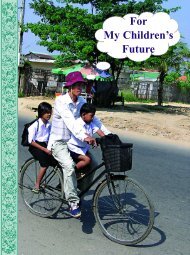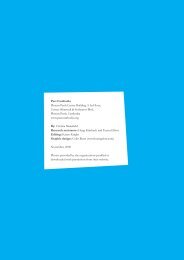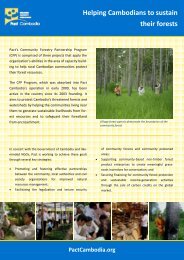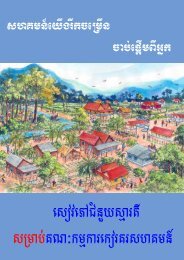Advocacy in Cambodia: Increasing Democratic ... - Pact Cambodia
Advocacy in Cambodia: Increasing Democratic ... - Pact Cambodia
Advocacy in Cambodia: Increasing Democratic ... - Pact Cambodia
Create successful ePaper yourself
Turn your PDF publications into a flip-book with our unique Google optimized e-Paper software.
elections saw an <strong>in</strong>crease to 14 female members<br />
<strong>in</strong> a chamber of 122. This represented an <strong>in</strong>crease<br />
from 6% <strong>in</strong> the first session to 11% <strong>in</strong> the 1998<br />
session. In the Senate, created <strong>in</strong> March 2000 with<br />
the role as a reflection chamber, only eight out 61<br />
appo<strong>in</strong>ted members are women (13%). To combat<br />
this, the M<strong>in</strong>istry and NGOs actively encourage<br />
women to take more political responsibility and<br />
run for elected office, and also organize workshops<br />
and publications <strong>in</strong>form<strong>in</strong>g women about their<br />
rights.<br />
Currently, the proportional party<br />
representation system used <strong>in</strong> elections <strong>in</strong>hibits<br />
the election of <strong>in</strong>dependent candidates. As political<br />
parties control the lists of their candidates and<br />
s<strong>in</strong>ce male party members usually have seniority<br />
over female members, it is generally unlikely for<br />
women to be given prime or prom<strong>in</strong>ent positions<br />
on party lists. To try to change this situation, <strong>in</strong><br />
2000 NGOs advocated strongly for legislation<br />
mandat<strong>in</strong>g a m<strong>in</strong>imum percentage of women<br />
candidates on electoral ballots for commune<br />
councils. Unfortunately, their efforts were<br />
unsuccessful. (See case study on Commune<br />
Council Election Law).<br />
As a fallback to the above position, NGOs<br />
worked to encourage parties to voluntarily <strong>in</strong>clude<br />
women candidates on their commune council<br />
electoral lists. Although the three ma<strong>in</strong> political<br />
parties accepted <strong>in</strong> pr<strong>in</strong>ciple to nom<strong>in</strong>ate 30%<br />
women to their party roster lists, only one party<br />
achieved this objective. On a more encourag<strong>in</strong>g<br />
note, <strong>in</strong> 2001, the Royal Government and the<br />
M<strong>in</strong>istry of Interior appeared to take extra efforts<br />
to employ women <strong>in</strong> the newly created Commune<br />
Clerks positions.<br />
With<strong>in</strong> the current adm<strong>in</strong>istration, only two<br />
out of 24 full-fledged m<strong>in</strong>isters are women, a low<br />
number, but still an improvement over the 1993<br />
adm<strong>in</strong>istration. At the prov<strong>in</strong>cial adm<strong>in</strong>istrative<br />
level, there were no women appo<strong>in</strong>ted as head of<br />
the 24 prov<strong>in</strong>ces or municipalities. With<strong>in</strong> the<br />
judiciary, there are no female members of the<br />
Supreme Court. A woman is the head of the Court<br />
of Appeals and is also the only female member of<br />
the Council of Magistracy. Of the 220 or so tra<strong>in</strong>ed<br />
and practic<strong>in</strong>g lawyers <strong>in</strong> <strong>Cambodia</strong>, only 20 are<br />
women. Of 110 judges, eight are women, while<br />
none of the 40 prosecutors are women. Female<br />
civil servants seem to be concentrated <strong>in</strong> nondecision<br />
mak<strong>in</strong>g positions <strong>in</strong> their m<strong>in</strong>istries, and<br />
some evidence suggests that <strong>in</strong>stead of be<strong>in</strong>g<br />
allowed to<br />
Despite Constitutional provisions and the<br />
efforts of the MoWA and many NGOs,<br />
the number of women hold<strong>in</strong>g leadership<br />
positions rema<strong>in</strong>s small.<br />
use their<br />
technical<br />
s k i l l s ,<br />
qualified<br />
women are<br />
assigned adm<strong>in</strong>istrative work. This same situation<br />
prevails <strong>in</strong> both the military and police forces,<br />
where women are <strong>in</strong> the vast m<strong>in</strong>ority and usually<br />
hold only token or m<strong>in</strong>or positions.<br />
S<strong>in</strong>ce the 1993 elections, the Royal<br />
Government has begun to recognize the important<br />
role played by NGOs and civil society<br />
organizations <strong>in</strong> the country’s development and<br />
the non-governmental sector has been allowed to<br />
emerge as an advocate for social justice and a<br />
partner <strong>in</strong> the fight aga<strong>in</strong>st poverty. As a general<br />
rule, women are better represented <strong>in</strong> NGOs than<br />
<strong>in</strong> most other organizations or agencies. Women<br />
assume leadership roles <strong>in</strong> several NGOs and have<br />
been effective <strong>in</strong> affect<strong>in</strong>g changes, particularly <strong>in</strong><br />
the area of women’s rights.<br />
Strategies<br />
• Workshops for Commune Clerk<br />
candidates, to assist them <strong>in</strong> pass<strong>in</strong>g the entrance<br />
exam.<br />
• Tra<strong>in</strong><strong>in</strong>gs, workshops, and media<br />
publications focused on legal rights and human<br />
rights.<br />
• Lobby<strong>in</strong>g for law requir<strong>in</strong>g a quota system<br />
for female candidates (unsuccessful as yet).<br />
Obstacles<br />
• Men control political parties and decide<br />
who election candidates are.<br />
• Women lack disposable <strong>in</strong>come needed to<br />
run for elections, especially national elections.<br />
• Women are generally not expected to<br />
participate <strong>in</strong> politics or <strong>in</strong> community leadership<br />
roles. There is generally lack of active support by<br />
husbands, family, or communities for women to<br />
engage <strong>in</strong> public office.<br />
• Women’s lack of self-confidence and<br />
awareness of their limited education prevents<br />
them from consider<strong>in</strong>g themselves qualified for<br />
public office. There is a lack of role models and<br />
traditions relat<strong>in</strong>g to public service for women.<br />
Impact of <strong>Advocacy</strong> on Women’s Issues<br />
Policy<br />
In addition to draft domestic violence<br />
legislation and efforts to legalize prostitution,<br />
there is an ongo<strong>in</strong>g effort to get the government<br />
to amend the Family Law that was ratified dur<strong>in</strong>g<br />
the State of <strong>Cambodia</strong> adm<strong>in</strong>istration around<br />
1989. The Family Law regulates marriage and<br />
divorce, as well as issues related to children such<br />
as custody and adoption. Advocates believe the law<br />
to be greatly outdated and to lack gender<br />
sensitivity. For example, the law currently<br />
stipulates that women are required to wait 300<br />
Case Studies<br />
79



